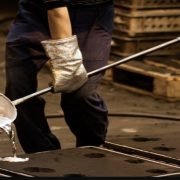The Differences Between Casting and Forging
The Differences Between Casting and Forging
1. Different production process:
Casting is a processing method in which the metal is melted into a liquid and poured into a mold, and then cooled, solidified and cleaned to obtain a casting of the desired shape. Casting can produce various objects with complex shapes.
Forging is to use methods such as hammering to make a metal material in a plastic state into a workpiece with a certain shape and size, and to change its physical properties.
2. Forging and casting purposes:
Casting is a relatively economical method of forming blanks, which is generally used for parts with complex shapes.
Forging is generally used in the processing of forgings of a certain shape and size.
3. Advantages of casting and forging:
Casting:
- It can produce parts with complex shapes, especially blanks with complex cavities.
- Wide adaptability in size, from a few grams to hundreds of tons.
- Wide sources of raw materials, low prices, such as scrap steel, scrap parts, chips, etc.
- The shape and size of the casting are very close to that of the parts, which reduces the amount of cutting, which is non-cutting.
- Widely used. 40% to 70% of agricultural machinery and 70% to 80% of the weight of machine tools are castings.
Forging:
Forging can eliminate defects such as loose as-cast during the smelting process and optimize the microstructure. At the same time, due to the preservation of the complete metal streamline, the mechanical properties of forgings are generally better than castings of the same material.
4. Disadvantages of casting and forging:
Casting:
- The mechanical properties are not as good as forgings, such as coarse structure and many defects.
- In sand casting, single piece and small batch production, the labor intensity of workers is high.
- The quality of castings is unstable, there are many procedures with the complicated influencing factors.
Forging:
- In forging production, trauma accidents are prone to occur.
- The cost is much higher than casting.
Yide Casting is known as a professional iron foundry in China, has rich casting experience in casting and machining, we are committed to producing quality but competitive price casting iron parts for our customers, all of our casting iron parts has been marked as “JM”, we want to develop Yide casting, JM casting into the world, if you are looking for a casting iron foundry, please don’t hesitate to contact us, send us your drawing file, we’d like to serve you and provide best casting iron products.




Leave a Reply
Want to join the discussion?Feel free to contribute!